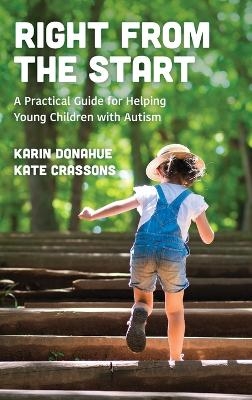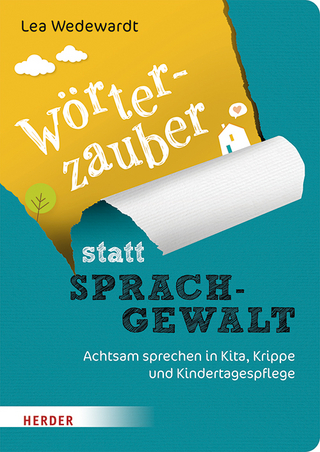
Right from the Start
Rowman & Littlefield (Verlag)
978-1-4758-4440-5 (ISBN)
This book argues that autistic children can be successful in early learning environments when teachers and parents understand the basics of autism, and when they have the tools to help these children expand their social and emotional skills. For parents and teachers who may be unfamiliar with autism (especially in its milder, more elusive forms), Right from the Start is an indispensable resource explaining the best practices for teaching young children on the spectrum. The book offers practical strategies that any teacher can easily incorporate into her daily routine—strategies that enrich the learning environment for neurotypical children as well. Right from the Start is also a useful resource for parents who can practice many of the book’s techniques at home to reinforce the development of key skills.
While many educational and therapeutic approaches to autism emphasize changing children's behavior and gaining their compliance, this book foregrounds the importance of self-regulation. This concept refers to a person’s ability to cope with emotional highs and lows, to control his or her reactions to events, and to feel “just right.” It is important that we help children learn to
recognize, assess, and modulate their feelings because self-regulation is the foundation of all learning and social development. Children need to be able to self-regulate to get through the day and to function well in the long term. While all young children struggle with self-regulation, autistic children find it especially difficult to manage their strong feelings. As a result of their neurodifferences, these children experience high levels of anxiety, sensitivity to stimuli in the environment, and difficulty understanding the nuances of social interaction. These and other challenges compromise autistic children’s ability to self-regulate.
In addition to discussing the importance of self-regulation, the book addresses the following key aspects of autism: social interaction, play skills, and sensory processing issues. After explaining why children experience challenges in these areas—and how such challenges impact self-regulation—the book offers techniques designed to help children improve their coping skills and overcome the various difficulties associated with autism. The chapters outline concrete strategies for helping children increase their social awareness, manage their sensory needs, engage with teachers and peers, and develop the language necessary for communicating emotions.
With the tools in this book, parents, teachers, and administrators can help autistic children thrive from the first moment they ever set foot in a classroom.
Dr. Karin Donahue is an Assistant Professor of Psychology at Northampton Community College in Bethlehem, PA. She is also a Behavior Specialist Consultant, specializing in autism, and has over thirty years of clinical experience working with children and their families. Dr. Kate Crassons is an associate professor of English at Lehigh University and the director of Lehigh University Press. Her research and teaching focus on a range of topics including social justice, neurodiversity, and disability studies.
Preface
Acknowledgements
Introduction: An Exceptional Child, An Unexceptional Story: A Parent’s Perspective on the Preschool Years
Part I: Self-Regulation: The Key to Making it Through the Day
Chapter 1: The Case for Self-Regulation
Chapter 2: Why Do Autistic Children Have Difficulty Self-Regulating?
Part II: Setting Children Up for Success
Chapter 3: Adjust Learning Experiences and the Environment
Chapter 4: Emphasize Structure and Consistency
Chapter 5: Foster Collaboration and Emotional Awareness
Part III: Social Skills
Chapter 6: Autistic Children and Social Skills Challenges
Chapter 7: Teaching Social Thinking
Chapter 8: Teaching Conversational Skills
Chapter 9: Building Social Confidence across Settings
Part IV: Encouraging Imaginative Play
Chapter 10: When Playtime Isn’t All That Fun
Chapter 11: Teaching Play and Building Imagination
Chapter 12: Facilitating Play with Peers
Chapter 13: Maintaining Play and Coping with Resistance
Part V: Making Sense of the Senses
Chapter 14: The Eight Senses
Chapter 15: Signs and Symptoms of Sensory Processing Challenges in Children
Chapter 16: Dominant Classes of Sensory Processing Disorder: Profiles and Strategies
Chapter 17: General Approaches to Managing Sensory Processing Disorder
Conclusion: A New Lens of Understanding
Appendix
References
About the Authors
| Erscheinungsdatum | 24.11.2019 |
|---|---|
| Verlagsort | Lanham, MD |
| Sprache | englisch |
| Maße | 161 x 236 mm |
| Gewicht | 485 g |
| Themenwelt | Sachbuch/Ratgeber ► Gesundheit / Leben / Psychologie ► Schwangerschaft / Geburt |
| Sozialwissenschaften ► Pädagogik ► Sonder-, Heil- und Förderpädagogik | |
| ISBN-10 | 1-4758-4440-9 / 1475844409 |
| ISBN-13 | 978-1-4758-4440-5 / 9781475844405 |
| Zustand | Neuware |
| Haben Sie eine Frage zum Produkt? |
aus dem Bereich


